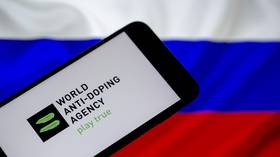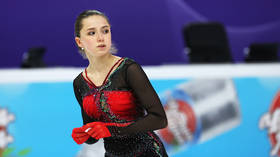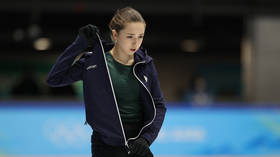Russian officials respond after Valieva test delay blame

The Russian Anti-Doping Agency (RUSADA) has insisted it was not at fault for delays to Kamila Valieva's doping sample after appearing to be blamed by the World Anti-Doping Agency (WADA).
The Court of Arbitration for Sport (CAS) threw out an attempt by WADA on Monday to suspend 15-year-old Russian figure skating prodigy Valieva from the Beijing Games for a positive doping sample from December 25.
Through a statement, RUSADA reacted to the CAS ruling and responded to claims that it had not flagged the case as a priority with a WADA-accredited laboratory in Stockholm, supposedly causing a delay for the result to be returned.
The Russian body stressed that it was "necessary" to clear up a few points about the delay of the analysis of the athlete's sample due to "the information disseminated in the media."
RUSADA insisted that Valieva's sample taken during the Russian championships in December was delivered to the laboratory in Sweden "in sufficient time to perform the analysis within the standard time frame."
"After the expiration of the international standard, the laboratory informed [RUSADA] of delays in testing and reporting due to another wave of Covid-19, [and] an increase in the incidence [of cases] among laboratory staff and quarantine rules," RUSADA continued.
"At the same time, in its messages, the laboratory indicated the deadlines for the availability of the analysis' results, allowing [us] to receive information from the laboratory by the end of January 2022, that is, before the start of the Olympic Games in Beijing.
"Also, in January, the laboratory informed [us] that the analysis would be performed as a priority, however, an adverse analysis report was submitted on February 7, 2022," RUSADA added.
"Disclosure of other details regarding the procedure for the analysis of the athlete's sample is unacceptable and may lead to a violation of the interests of the parties," RUSADA warned.
RUSADA issued Valieva with a provisional suspension upon receiving the positive test result last week, but that suspension was lifted by a disciplinary panel upon appeal from the figure skater – a decision backed by CAS on Monday.
RUSADA said it continues to investigate the case and that an independent disciplinary body will "evaluate all the circumstances related to a possible anti-doping rule violation."
RUSADA's rebuttal comes after WADA provided its own response to the CAS ruling, seemingly laying the blame at the door of Russian officials for the test result delay.
"According to information received by WADA, the sample in this case was not flagged by RUSADA as being a priority sample when it was received by the anti-doping laboratory in Stockholm, Sweden. This meant the laboratory did not know to fast-track the analysis of this sample," WADA alleged.
CAS reached its decision due to figure skating ace Valieva's "protected person" status as a minor under the WADA Code, while fearing that ruling her out of further competition at Beijing 2022 would cause her "irreparable harm".
The delay in receiving the test result, which only came to light after Valieva had helped the Russian Olympic Committee (ROC) achieve gold in the figure skating team event on February 7, was also a factor in the CAS ruling.
CAS noted that Valieva has not tested positive in Beijing, while the ROC has stressed the skater repeatedly returned negative tests before and after her positive sample for the banned heart medicine trimetazidine.
Valieva will now go for gold in the women’s individual figure skating event in Beijing, starting with the short program on Tuesday before the free skate routines on Thursday.
The IOC has already confirmed it won't hold a medal ceremony if Valieva achieves a podium finish due to the ongoing investigation into her positive sample.














